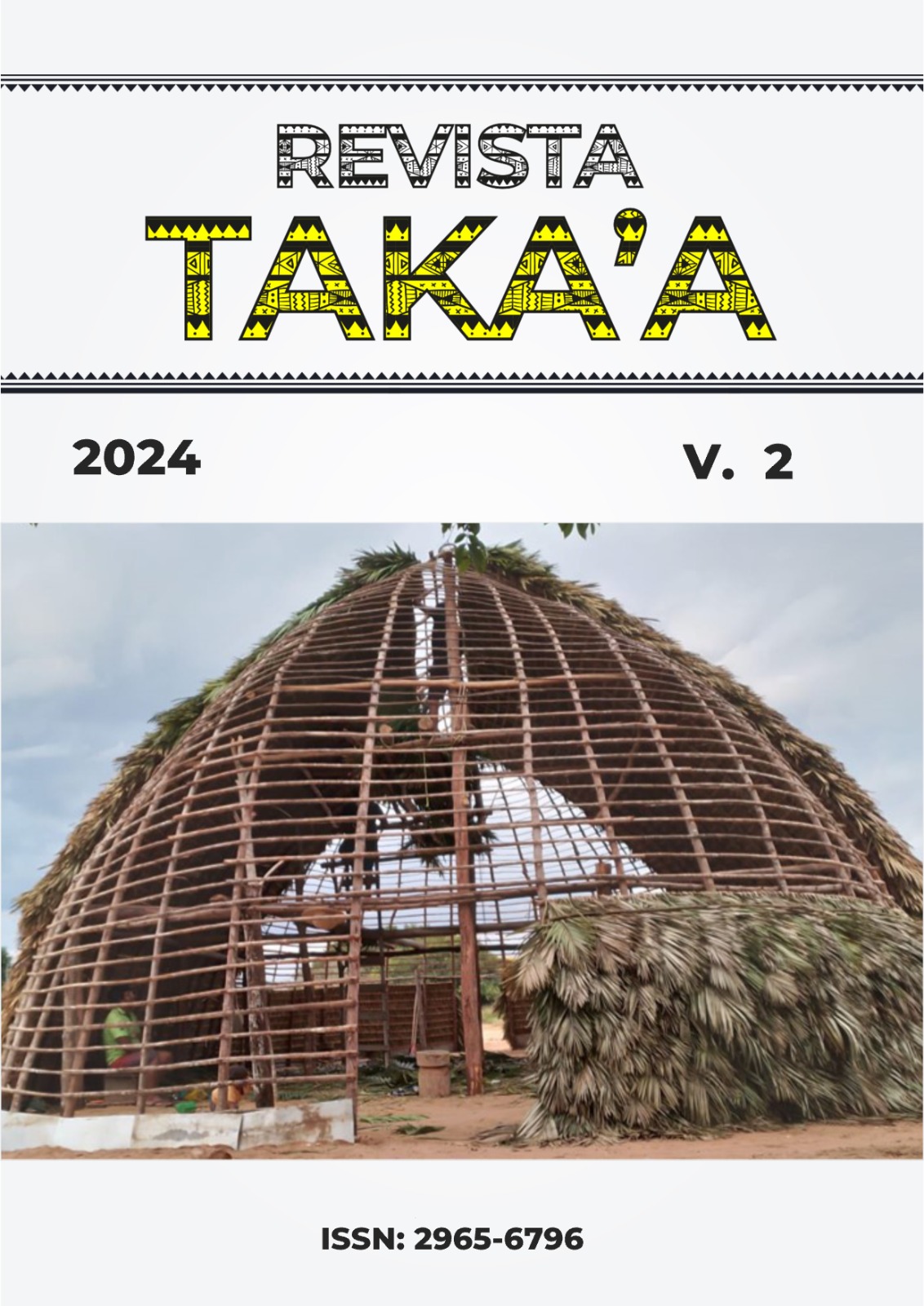RITUAL SONGS AS A MEANS OF STRENGTHENING APYÃWA LANGUAGE AND CULTURE
DOI:
https://doi.org/10.30681/rtakaa.v2i1.13210Keywords:
Apyãwa language, Traditional knowledge, TeachingAbstract
In this paper, we present research in the field of Apyãwa mother tongue teaching, which focuses on Apyãwa ritual songs. Our desire is to contribute to strengthening and maintaining our mother tongue in our villages, through the school, which plays a very important role in working with the written modality of the language. In this sense, this research is very important in the current context of our people, since the songs are elements made up exclusively of the riches of our ancestral language. The methodology of my work consists primarily of listening to the knowledge of indigenous consultants, such as Apyãwa elders, and through bibliographical research. As this is a research looking at the teaching and strengthening of the language, our focus is on pedagogical action, in accordance with our school's curriculum proposal, present in the Pedagogical Political Project-PPP. Pedagogical action is the essential basis for the didactic-methodological path, during which we move the entire teaching-learning process towards ritual songs, working on reading and written production. Another purpose of the work is aimed at empowering our language policy in the community, to generate more sources of ancestral knowledge to improve and enrich the pedagogical practice of Apyãwana teachers, as well as the effective training of students. For this reason, we also emphasize that the production of materials on this subject is extremely important for the teaching of mother tongue in Apyãwa village schools. Therefore, this work is very relevant, in the sense of strengthening our culture and the policy of valuing the Apyãwa language, both in the context of Apyãwa education and in the context of Apyãwa school education.
Downloads
References
BRASIL. [Constituição (1988)]. Constituição da República Federativa do Brasil de 1988. Brasília, DF: Presidente da República, [2016]. Disponível em: http://www.planalto.gov.br/ccivil_03/constituicao/constituicao.htmAcesso em: 08/08/2024
BRASIL. Referencial Curricular Nacional para as Escolas Indígenas/Ministério da Educação e do Desporto, Secretaria de Educação Fundamental. - Brasília: MEC/SEF, 1998.
FERREIRA, Waldineia Antunes de Alcântara; ZOIA, Alceu; ALMEIDA, Elizabeth Rezende. Produção de materiais pedagógicos (didáticos) em escolas indígenas: uma parceria entre universidades e aldeias. Revista da Faculdade de Educação, [S. l.], v. 40, p. e402404, 2024. DOI: 10.30681/faed.v40i.12577. Disponível em: https://periodicos.unemat.br/index.php/ppgedu/article/view/12577.Acesso em: 16 dez. 2024.
FRANCO, Maria Amélia do Rosario Santoro. Prática pedagógica e docência: um olhar a partir da epistemologia do conceito. R. Bras. Est. Pedag. [online]. 2016, vol.97, n.247, pp.534-551. ISSN 2176-6681.
FREIRE, Paulo. Pedagogia da autonomia: saberes necessários à prática educativa.44. ed. Rio de Janeiro: Paz e Terra, 1996.
PAULA, Eunice Dias de. Os saberes e valores indígenas transformando os processos de escolarização. Revista de Educação Pública, Cuiabá, v. 26, n. 62/1, p. 355-372, maio/ago. 2017
PROJETO POLÍTICO-PEDAGÓGICO DA ESCOLA INDÍGENA ESTADUAL TAPI’ITÃWA. Secretaria de Estado de Educação. Estado de Mato Grosso. Terra Indígena Urubu Branco. Confresa-MT, 2009.
RODRIGUES, Aryon Dall’Igna. Línguas brasileiras. São Paulo: Loyola, 1986.
TAPIRAPÉ, Nivaldo. Takãra: a casa da sapiência Apyãwa. Dissertação em nível mestrado profissional no Programa de Pós-Graduação Stricto Sensu em Ensino em contexto Indígena Intercultural (PPGECII), Campus de Barra do Bugres, 2022.
ZOIA, Alceu; TAPIRAPÉ, Taroko Edimundo. Desenho e escrita no mundo da criança Apyãwa: práticas pedagógicas interculturais. Revista Taka’a, [S. l.], v. 1, p. e2023001, 2023. Disponível em: https://periodicos.unemat.br/index.php/rtakaa/article/view/11718. Acesso em: 16 dez. 2024.
CONSULTORES NATIVOS
TAPIRAPÉ, Kaorewygi (Korari). Chefe de rituais e cantador. (Fonte oral). Saberes Tradicionais Apyãwa. Terra Indígena Urubu Branco. Aldeia Apyãwa. Confresa-MT,2023.
TAPIRAPÉ, Luís Myryxiwyga. Chefe de rituais e cantador. (Fonte oral). Saberes Tradicionais Apyãwa. Terra Indígena Urubu Branco. Aldeia Apyãwa. Confresa-MT,2023.








